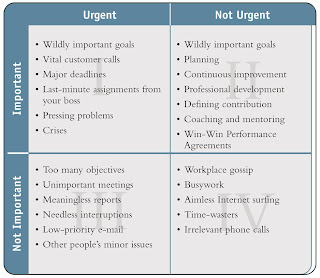Last week we looked at the first part of weekly planning – establishing your roles in life. This week, I want to think a little more about why that’s important and what weekly planning will give you that you don’t have now.
In his bestselling book, “The 7 Habits of Highly Effective People”, Stephen Covey talks about the Time Matrix – a four-box model allowing tasks to be categorised based on whether they are important and/or urgent. It’s not a new model – the first reference I’ve found to it is as the Eisenhower method, as it was said to be used by the US President, although it’s not clear whether that’s apocryphal or not.

© FranklinCovey
When I run Time Management workshops, I’ll very often ask people what they would do if they had a 25th hour – you can think about this question, too. As I’m psychic, I know you’re thinking that you would spend that hour sleeping so I’ll let you do that for a couple of weeks and then you have to do something else: you can do anything you want. Inevitably, the things people come up with are Quadrant II activities; they say they would spend time with their loved ones, play with their kids, learn a language or a musical instrument, travel, paint or simply sit and read a book. You probably came up with something similar.
Why do they never get round to doing these things; why do they need a 25th hour? Because most people spend most of their time in Quadrants I and III. By definition, Quadrant II activities aren’t urgent and there are always other, urgent things to do which take priority – even when those urgent things aren’t important. The Quadrant II activities are left for those times when you have less to do; when things aren’t so crazy around here; when things calm down a bit.
It doesn’t have to be that way. What weekly planning gives you is the opportunity to schedule in some of those Quadrant II activities. And because the most important things in our lives tend to revolve around relationships – with ourselves and with others - establishing your roles in life is more than just categorising what you do. It also means thinking about how you do it. Decide what kind of bricklayer or musician you want to be and then schedule activities to help you achieve that.
The great benefit of weekly planning is that it changes your focus, lifting you out of the day-to-day grind of the urgent and into the future. We all have dreams, hopes or aspirations – they may be big or small but they are all important and should never be put off while we deal with things that are, fundamentally, unimportant. As Goethe said, “things that matter most must never be at the mercy of things that matter least.”




No comments:
Post a Comment